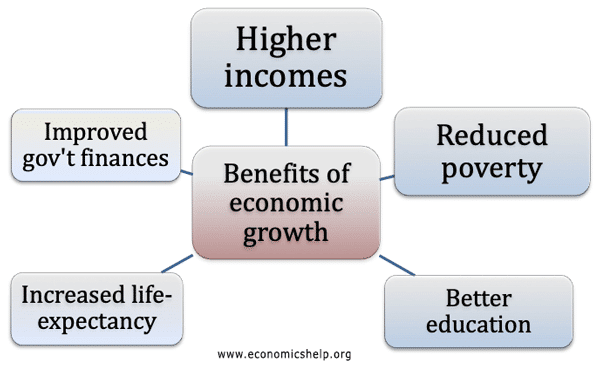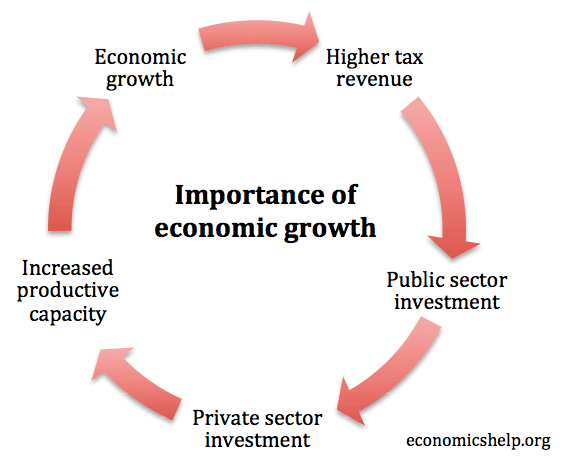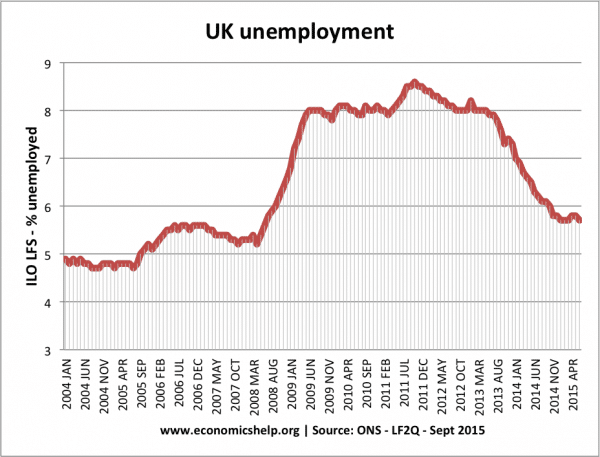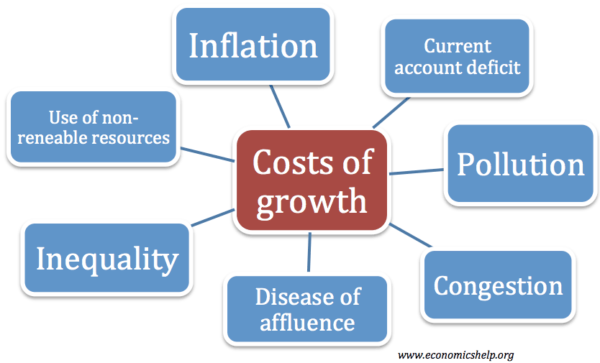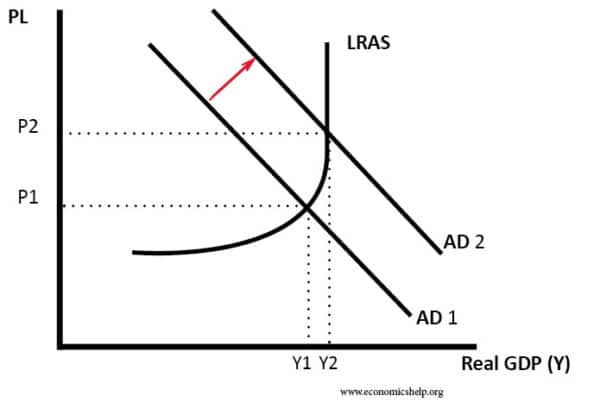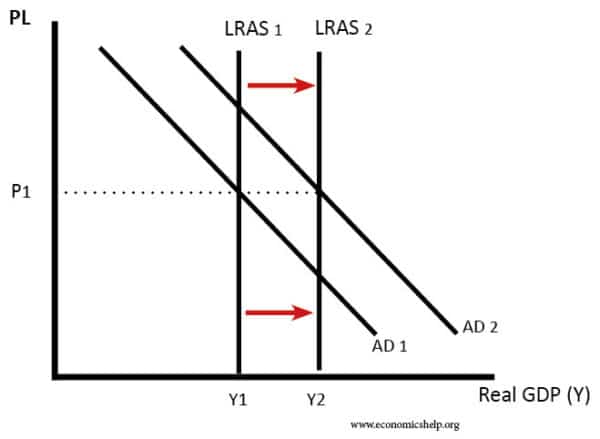Economic growth means an increase in real GDP – this leads to higher output and higher average incomes.
Governments often try to increase the growth rate because it will have various advantages. These include
Benefits of economic growth
Increased consumption. Firstly, higher GDP implies the economy is producing more goods and services and therefore consumers can enjoy more goods and services. If human welfare is linked to consumption then growth will benefit society. Higher levels of consumption will help to reduce any incidence of absolute poverty (when people can’t meet basic necessities of life.) This may not be so obvious for developed countries, like the UK and US, but for developing economies, economic growth and rising incomes play a big role in lifting people out of poverty.
Higher investment in public services. With higher GDP the government will be able to collect more taxes; this is because people as incomes rise and people spend more they will pay more income tax and VAT. This is beneficial because the government can use this increased revenues to reduce the level of government borrowing and/or spend more on public services and investment in the country infrastructure. This investment in public services can help improve the long-term performance of the economy. For example, better infrastructure enables a lower cost of trade. Therefore, growth can cause a virtuous cycle of higher investment leading to higher growth – which enables more investment.
Lower unemployment. Higher economic growth will also lead to an increase in demand for labour as firms will be producing more. Therefore unemployment will fall, this has various advantages such as lower government spending on benefits and less social problems. If the economy is in recession, then increasing the rate of economic growth will be an important step in reducing unemployment.
The rise in unemployment in 2008/09 was due to negative economic growth.
Costs of economic growth
However economic growth has various costs.
Possible inflation. Firstly if economic growth is unsustainable and is higher than the long-run trend rate inflation is likely to occur.
Furthermore, this temporary boom in output is unlikely to continue and may be followed by an economic downturn or recession. Thus, it can be very damaging to increase the rate of economic growth above the sustainable rate. This boom and bust cycle happened in the UK in the late 1980s and early 1990s.
Current account deficit. Also, an increase in economic growth could lead to a balance of payments problem. If increased consumer spending, like in the UK, causes the growth then there will be an increase in imports. Is imports rise faster than exports there will be a deficit. However, growth could be export-led e.g. Japan’s growth in the 1960s and 70s and China currently.
- However, if growth is increased by increasing the productive capacity and increasing the long run trend rate then inflation will not occur and the growth will be sustainable.
However, even an increase in the long run trend rate can have undesirable effects. In some cases, economic growth can have unintended costs to living standards. This includes
Environmental costs. Higher output will lead to increased pollution and congestion which can reduce living standards e.g. increase in breathing problems, time wasted in traffic jams e.t.c. China’s break-neck period of economic growth has led to increased pollution and congestion levels. Also, growth will lead to the consumption of non-renewable resources which may place costs on future generations.
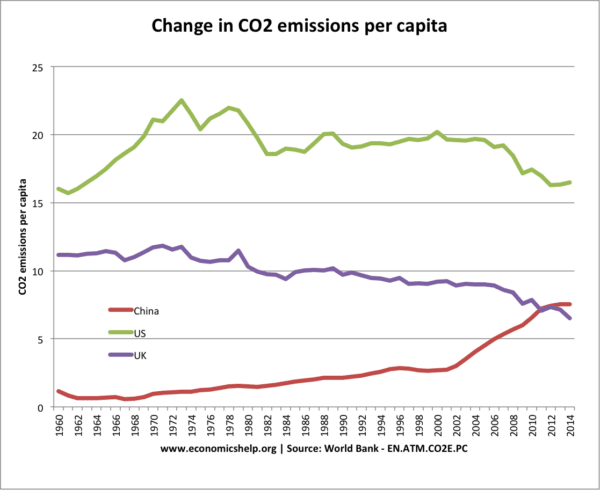
- However, higher economic growth may encourage governments and consumers to spend more of their disposable income on protecting the environment. The poorest countries often have bad pollution because they cannot afford to reduce it. Economic growth without pollution is possible – if care is taken to concentrate on more environmentally friendly methods.
2. Income inequality. Economic growth often leads to increased inequality because growth benefits the richer most because they own assets and have the best-paid jobs. Thomas Piketty observed that, without sufficient policies of redistribution, the wealthy tend to increase their wealth at a faster rate than economic growth – because they can reinvest their dividends.
- However, equally economic growth can reduce relative poverty and inequality. Higher growth tends to enable governments to be able to afford welfare states and offer a minimum level of production. Economic growth from 1900 to 1970 helped reduce levels of inequality in the US and Europe.
3. Social costs of economic growth. If society is geared towards economic growth and maximising consumption it could lead to a decline in quality of life.
- Maximising hours worked. We can increase economic growth by making people work longer hours, but they will then miss out on the possibility of leisure time. (However, on the other hand, economic growth and higher productivity, in theory, enables people to work less.
- Monetary values. A society geared towards maximising GDP and consumption may prioritise income and wealth over promoting the public good. For example, building new power plant which has environmental costs.
- Disease of affluence. With higher growth, we have chosen a richer (higher fat, sugar) diet, which causes problems such as diabetes and heart disease. Also, the increased levels of pollution arising from growth contribute to health problems such as asthma.
Conclusion
Economic growth has many obvious benefits however the desirability depends upon many factors such as; the nature of growth, is the growth sustainable? Does it harm the environment? However, rather than trying to stop economic growth, it is better to concentrate on improving the nature of economic growth and being aware that many factors determine the desirability of economic growth.
Related

